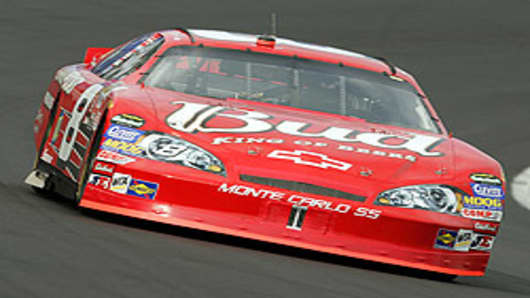Big ratings declines for a second straight season, including drops during the 10-race chase that was supposed to inject more life into the sport, suggest NASCAR is gasping for air. And in interview after interview NASCAR chairman and CEO Brian France and president Mike Helton have failed to come up a specific reason.
They start with the economy, which is a valid excuse for the big attendance drops for NASCAR, which basically seek to host a huge crowd every Sunday in a different venue. But it doesn't hold water with TV. If people stay at home instead of go to the race, why aren't they tuning in?
Other excuses have included uniform starting times and races that are too long. Funny, the reason the organization changed start times is because different start times were hypothesized as one of the reasons for ratings declines. As for the length of races, I haven't seen much data that shows that people tune in for the final 20 laps or so to catch the end like that might late in the fourth quarter of an NBA game.
Then comes the rivalry argument or the lack of wins by important drivers. There just aren't many head to head battles people want to see, the reasoning goes. The truth is, the last great battle was Dale Earnhardt Sr. vs. Jeff Gordon and yet new fans came in droves in the five years after Dale Earnhardt died in 2001.
As for lack of wins by important drivers, sure Dale Earnhardt Jr. and Jeff Gordon didn't win this entire year. But the list of names that were going to resurrect NASCAR is way too long. Kyle Busch, the only real villain left, has to win more. Carl Edwards, the backflip man who won yesterday for only the second time, needs to win more. Jimmie Johnson wins too much. He's too nice of a guy. Earnhardt Jr. has even suggested the real problem is a lack of a fantasy platform like the NFL has.
You can see where I'm going here. There's too many problems to guess at and little willingness to accept that maybe those who sampled NASCAR in the wake of Earnhardt's death have left the sport forever.
Believe me, if there was a cosmetic way to get NASCAR back to where it was three or four years ago, it would have happened already. How do I know? Because of the money involved. Eight years worth of TV deals, which commenced in 2007 and will run through 2014, are worth $560 million annually to NASCAR. The networks paid 40 percent more because they negotiated the deal in 2005 when NASCAR was at its height.
What made NASCAR the envy of other sports leagues was where that growth was coming from. It was from the non-traditional markets, like New York, Chicago and Los Angeles, which previously hadn't sampled the sport. It was the 18-to-34 male demographic that is so coveted by advertisers. But those people might have just created a NASCAR bubble of sorts when they left the sport. Fox reported earlier this year that it noticed a 29 percent dilution in that demographic watching the sport.
NASCAR can do what it wants — tinker with the cars, the schedule, the length of races — but in my opinion, they've done everything they could have. It's time to accept that the sport is in a much better place than it was 10 years ago, but it's not the next great sport that's going to give the NFL, NBA or Major League Baseball a run for its money in terms of nationwide relevance.
Questions? Comments? SportsBiz@cnbc.com



